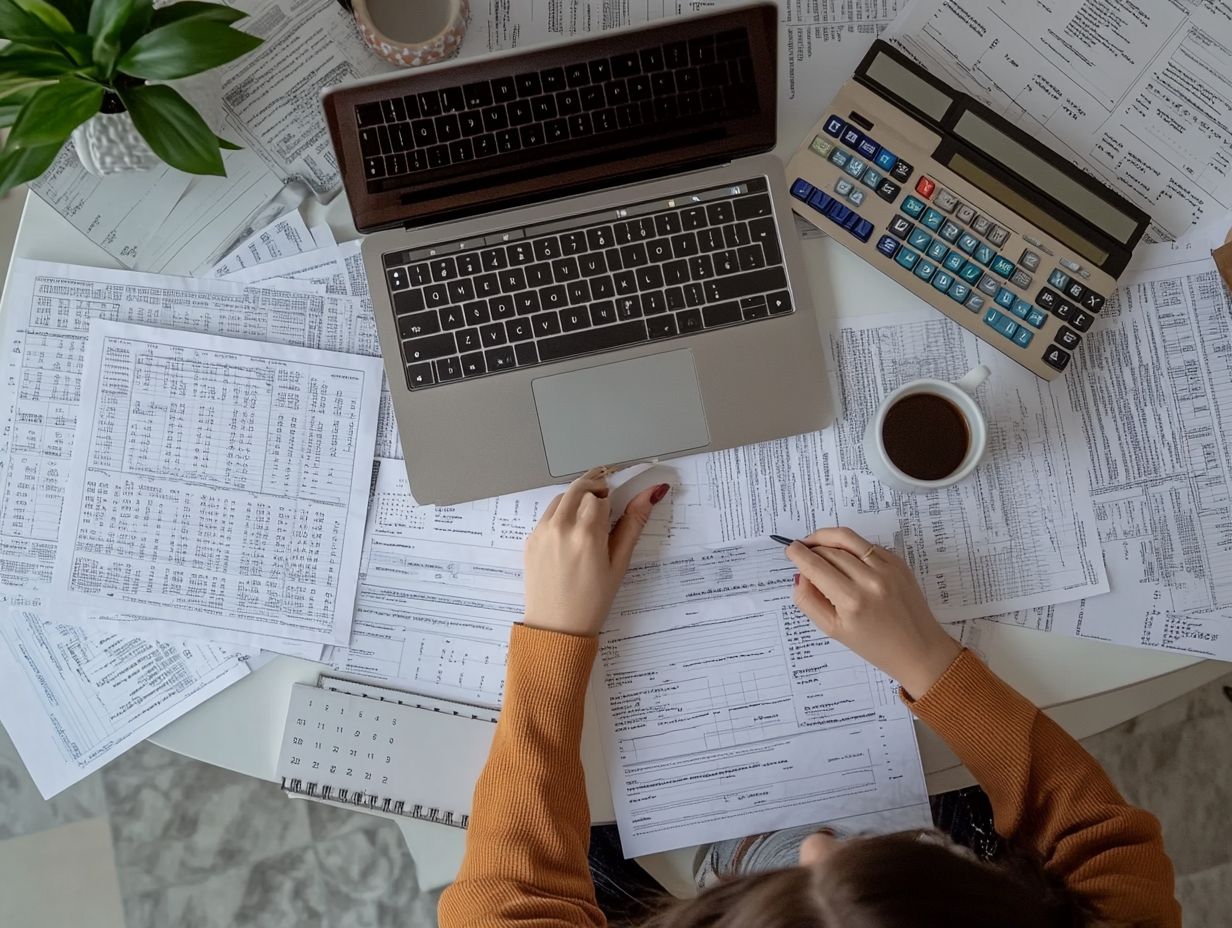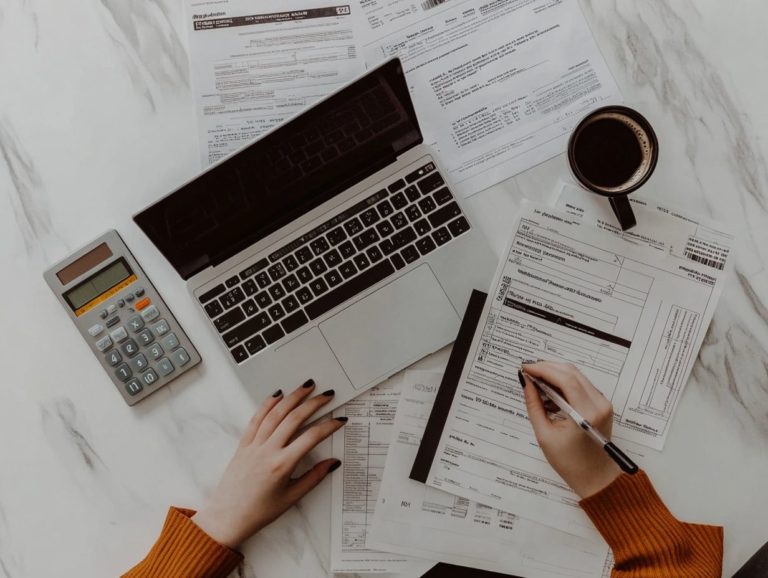What to Know About Sales Tax as a Freelancer
Navigating sales tax can feel overwhelming for freelancers who juggle multiple responsibilities. Understanding sales tax collection is vital to avoid costly mistakes and ensure compliance.
This article gives you a clear overview of sales tax essentials: whether you need to collect it, how to register for a permit, calculate the correct amount, and report it accurately. You’ll learn common pitfalls to avoid and find resources to simplify the process.
Whether you’re a seasoned freelancer or just starting out, this guide will equip you with the knowledge you need to tackle sales tax confidently.
Contents
- Key Takeaways:
- Do Freelancers Need to Collect Sales Tax?
- How to Register for a Sales Tax Permit
- Calculating and Reporting Sales Tax
- Common Sales Tax Mistakes for Freelancers
- Sales Tax Resources for Freelancers
- Frequently Asked Questions
- What to Know About Sales Tax as a Freelancer in the context of self-employment tax
- 1. Do I need to charge sales tax as a freelancer?
- 2. What is considered taxable as a freelancer?
- 3. How do I determine the sales tax rate to charge?
- 4. Do I need to register for a sales tax permit?
- 5. Can I deduct sales tax on my income tax return?
- 6. What happens if I don’t collect or remit sales tax?
Key Takeaways:

- Freelancers may need to collect sales tax based on their location and services.
- Registering for a sales tax permit is necessary. A step-by-step guide is available to help.
- Understanding how to calculate and report sales tax is crucial to avoid costly errors.
Understanding Sales Tax and Its Purpose
Sales tax is an essential part of your finances as a freelancer. It impacts how you manage your business across different locations.
This tax provides revenue for states and local governments, funding public services and infrastructure. It’s important to understand sales tax to comply with state regulations and avoid potential penalties tied to your freelance work, including the top tax mistakes freelancers make and how to avoid them.
Sales tax generally applies to the sale of tangible goods and certain services, but rates and regulations can vary significantly from state to state. For instance, California’s standard sales tax rate is 7.25%, while Texas sits at around 6.25%. You should also consider use tax, which applies when you buy items from out-of-state vendors.
The concept of tax nexus is crucial; it refers to how your physical presence or economic activity in a state can create tax obligations. If you sell products online to customers in various states, you may need to register for sales tax collection in those areas.
Overlooking these factors could lead to non-compliance and hefty fines. Don t risk costly penalties! Staying informed about local tax laws and updates is critical for your freelance success.
Do Freelancers Need to Collect Sales Tax?
As a freelancer, you might wonder, “Do I really need to collect sales tax on my professional services?” The answer isn’t straightforward; it depends on tax nexus and the specific nature of your services.
If you have a substantial presence or an established connection known as tax nexus in a given state, you’re obligated to collect sales tax on taxable goods and services. Understanding these nuances is essential for navigating your responsibilities smoothly.
Criteria for Sales Tax Collection
The criteria for sales tax collection can be intricate for freelancers, varying based on the type of service you provide and the specific regulations in each state. You need to evaluate whether you’ve established tax nexus, influenced by factors like physical presence, sales volume, and the nature of your services.
Some states also consider how you deliver your services and if you have a significant connection to the marketplace. For example, tax obligations for digital products might differ from those for tangible goods.
Certain jurisdictions even allow exemptions based on the nature of the work such as specific educational or non-profit services. Understanding these nuances is crucial for compliance; ignoring state regulations could lead to unwanted penalties.
Given this complexity, it’s wise to consult with tax professionals who can guide you through the intricacies and help ensure you meet local regulations effectively.
How to Register for a Sales Tax Permit
Registering for a sales tax permit is key to success for freelancers involved in transactions where sales tax applies. This permit allows you to legally collect sales tax from your clients.
The registration process may vary by state. Generally, you apply through your state s department of revenue or taxation. This ensures compliance with local regulations and IRS requirements, protecting your business and enhancing your professional reputation.
Step-by-Step Guide

To obtain a sales tax permit, follow a structured step-by-step guide that outlines the necessary actions for registration. This typically involves identifying the correct state agency, completing the application forms, and ensuring compliance with state regulations and local laws.
Before you start the application process, gather essential information such as your business structure, estimated revenue, and any relevant identification numbers. Having these details will streamline form-filling and help you avoid delays.
As you complete the forms, double-check for accuracy. Any mistakes could lead to complications or rejections. Familiarize yourself with local tax rates and regulations to ensure ongoing compliance. Stay informed about updates in tax laws to maintain good standing with state authorities.
Calculating and Reporting Sales Tax
Calculating and reporting sales tax is a crucial responsibility for freelancers. It ensures full compliance with tax laws and regulations, including IRS guidelines.
This detailed process requires determining the appropriate sales tax rate, calculating how much tax you owe on your sales, and reporting it promptly to the relevant authorities.
Taking these steps keeps you compliant and supports your professional reputation.
Methods for Calculating Sales Tax
You have various methods for calculating sales tax, which depend on the types of products or services you offer and the applicable sales tax rate. Mastering these methods is crucial for compliance with state regulations and accurate reporting to the IRS.
The two primary approaches you’ll encounter are the percentage method and the flat rate method. With the percentage method, take the total sale amount and multiply it by the applicable state sales tax percentage. For example, if you, as a graphic designer, charge $1,000 in a state where the sales tax rate is 7%, you would calculate $1,000 x 0.07, resulting in a $70 sales tax. Additionally, understanding the tax implications of freelance side hustles can be crucial for managing your finances effectively.
The flat rate method simplifies calculations by applying a set percentage regardless of the sale price. If you charge clients a flat 10% for all services as a freelance consultant, this method streamlines your invoicing process.
By mastering these methods, you can manage your tax liability with confidence.
Reporting and Paying Sales Tax
It s crucial to report and pay your sales tax on time! This ensures compliance and helps you avoid penalties from late submissions or incorrect filings. Depending on your state s requirements, you ll typically need to file sales tax returns monthly, quarterly, or annually.
Know the deadlines for submitting your sales tax returns so you don’t miss them. Necessary forms, often found on state tax websites, should be completed accurately to reflect all your taxable sales.
If you’re required to make quarterly payments, track your income and expenses diligently throughout the year; neglecting this can lead to reporting errors.
Non-compliance can lead to substantial fines, interest, and even audits. This highlights the importance of meticulous record-keeping and staying informed about your tax obligations.
Common Sales Tax Mistakes for Freelancers
As a freelancer, you may find yourself navigating a minefield of common sales tax mistakes that could lead to compliance issues and unwelcome penalties from the IRS. These errors may include miscalculating sales tax or failing to report the sales tax you’ve collected from clients.
This highlights the critical importance of understanding the details of your sales tax obligations. This ensures you stay on the right side of the law while protecting your hard-earned income. For freelancers, navigating quarterly taxes is also crucial.
Avoiding Costly Errors with the Help of Freelancers Union and Other Resources

Avoiding costly errors in sales tax compliance is crucial for freelancers who wish to maintain a strong financial standing and avoid penalties from tax authorities. This means ensuring accurate calculations and timely reporting, and understanding the nuances of state-specific regulations.
To minimize mistakes, freelancers should consider using software tools designed for calculation and record-keeping. These tools automate many tedious tasks, making the process efficient and less prone to errors.
Act now to regularly review your sales tax obligations. This can help catch discrepancies early, ensuring that every invoice is processed accurately. Staying informed about changes in tax laws and utilizing online resources such as how to choose the right tax software as a freelancer can provide invaluable support.
Get ahead with these smart strategies! By adopting them, freelancers can significantly enhance their compliance processes, navigating the complexities of sales tax with confidence and safeguarding their financial interests.
Sales Tax Resources for Freelancers
Accessing reliable sales tax resources is essential for you as a freelancer. It enables you to deftly navigate the complexities of tax regulations and compliance.
A wealth of tools, guides, and websites are at your disposal. These resources help you understand your obligations and ensure your filings are accurate and timely.
Useful Tools and Information
Utilizing effective tools and resources can simplify your sales tax management as a freelancer. They make it easier to maintain compliance and stay informed about state regulations. A variety of resources are available, including tax calculators, specialized software, and informative guides tailored specifically for freelancers.
For example, platforms like QuickBooks and TaxJar provide features designed to streamline the calculation and filing of sales taxes. This allows you to save time and minimize errors. The IRS website and local state revenue departments also offer invaluable educational materials that help you understand your obligations clearly.
Don t overlook online communities and forums. These supportive spaces enable freelancers to share insights and recommendations, fostering a network of informed professionals.
By leveraging these tools and educational resources, you can transform the task of managing your sales tax obligations from an overwhelming burden into a manageable endeavor.
Frequently Asked Questions
What to Know About Sales Tax as a Freelancer in the context of self-employment tax
As a freelancer, it is important to understand the basics of sales tax to comply with tax laws and avoid penalties. Here are 6 frequently asked questions about sales tax for freelancers.
1. Do I need to charge sales tax as a freelancer?

The answer depends on your location and the type of services or products you offer. If you are based in the United States, most states require freelancers to collect and remit sales tax for taxable goods or services. If you are unsure, consult with a tax professional or your state’s department of revenue.
2. What is considered taxable as a freelancer?
In general, tangible goods such as physical products are taxable, while services may or may not be taxable. However, each state has its own list of taxable and exempt goods and services, so it is important to research the laws in your state.
3. How do I determine the sales tax rate to charge?
The sales tax rate is based on where your buyer is located, not where you are. Be sure to collect the sales tax for the state and any local taxes where your customer resides.
4. Do I need to register for a sales tax permit?
This varies by state. Some states require all businesses, including freelancers, to register for a sales tax permit, while others have a sales threshold you must meet.
Check with your state’s department of revenue to find out what applies to you.
5. Can I deduct sales tax on my income tax return?
Absolutely! You can deduct sales tax paid on business expenses when filing your federal income tax return. Keep detailed records of your purchases and talk to a tax professional for guidance.
6. What happens if I don’t collect or remit sales tax?
Failing to collect or send sales tax when required can lead to penalties and interest from your state’s department of revenue. It’s vital to follow tax laws to avoid these issues!






